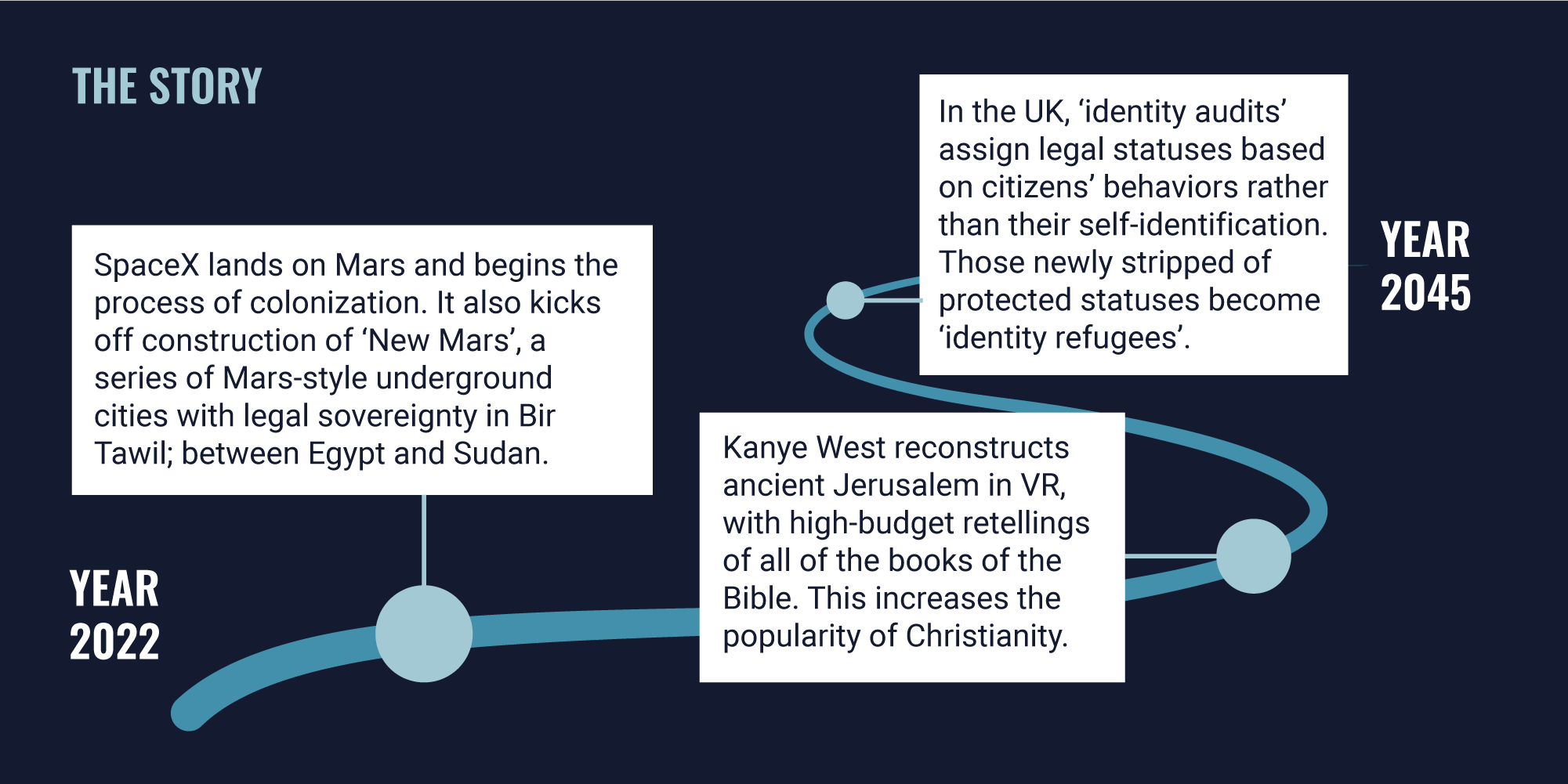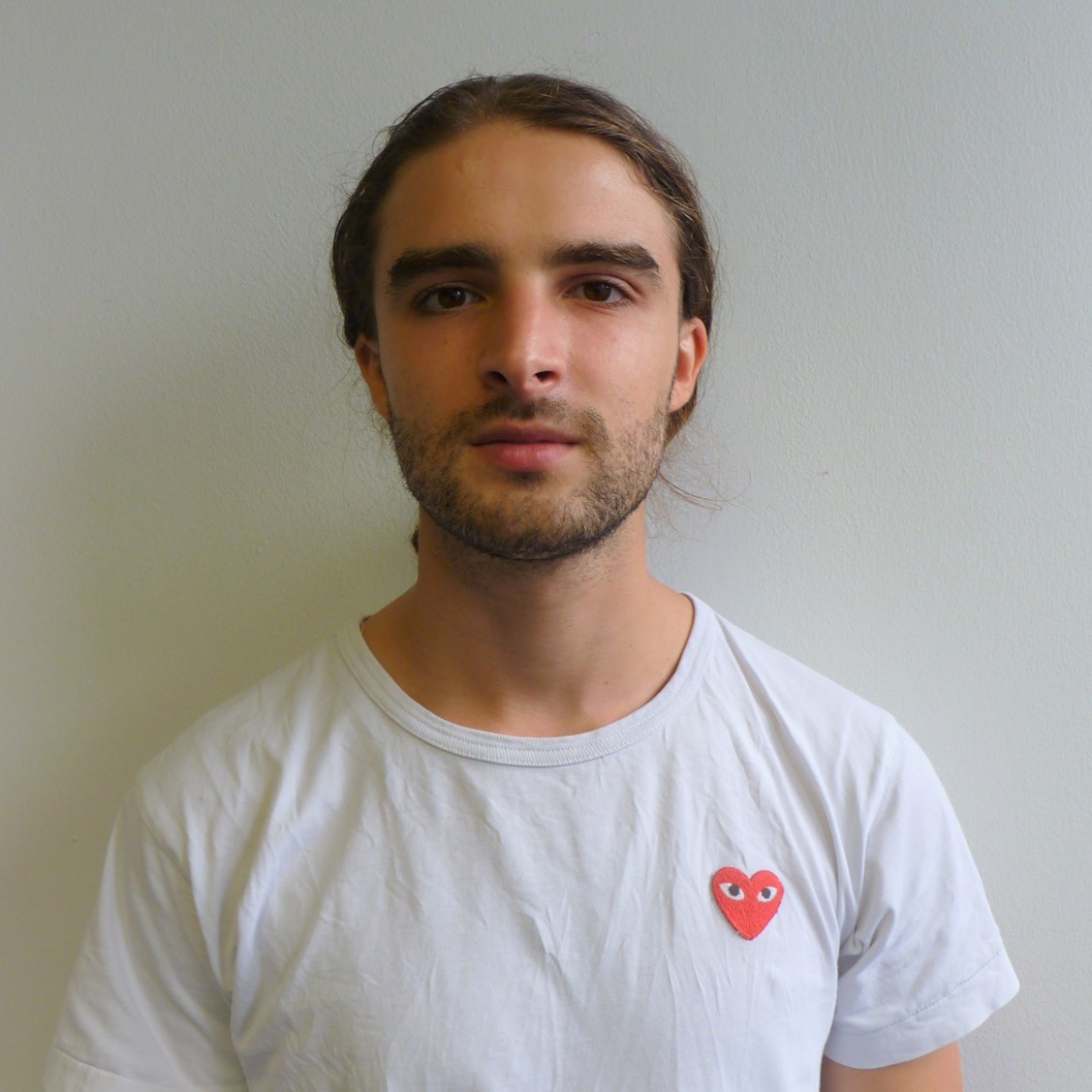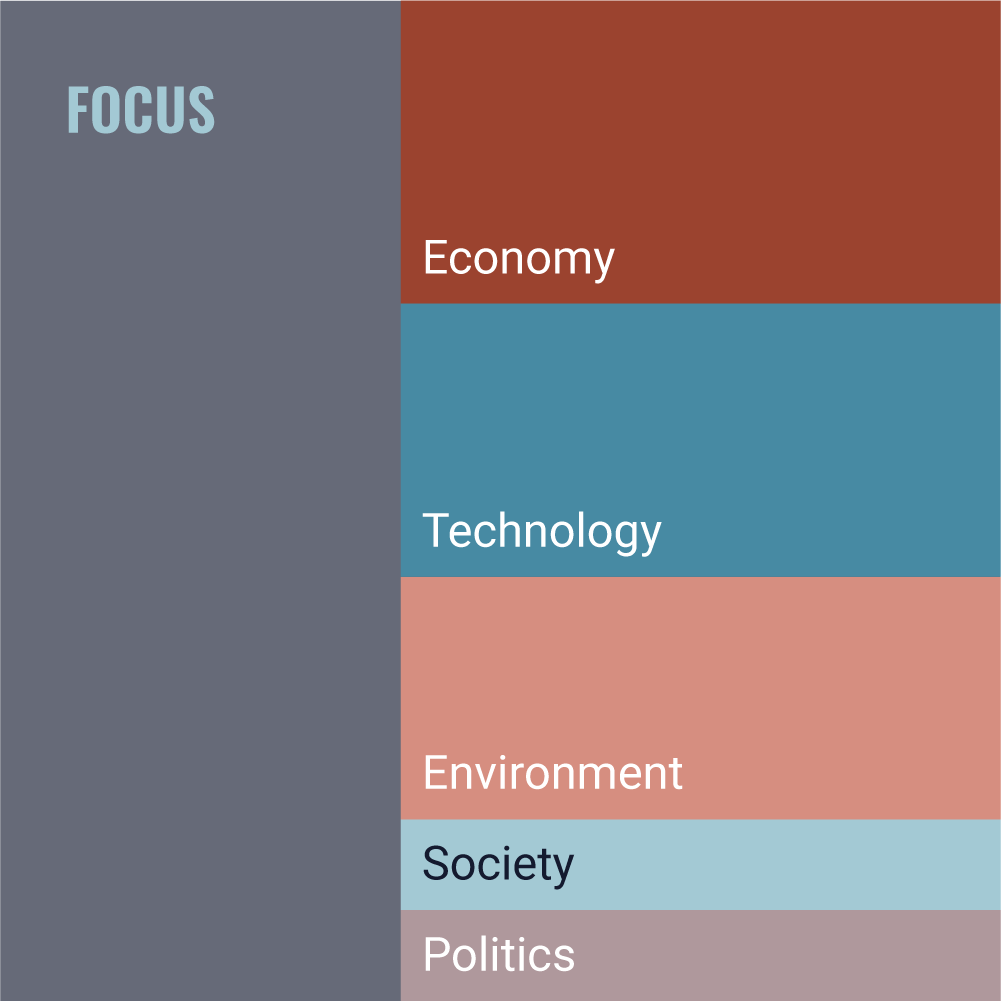
Imagine: What if narrow AI fractured our shared reality?
AGI is kept at a distance from practically impacting the world while narrow AI remakes the world completely. Most people don’t know or care about the difference and have no idea how they could distinguish between a human or artificial stranger in the Metaverse.
A realistic imagined future won’t all be good. So what about a world where inequality sticks around and AI fractures society into separate media bubbles, but on the plus side, our quality of life improves, with enhanced medicine, and those bubbles sustain their inhabitants. Can you get excited about a world with so many tradeoffs? Or do we need to aim higher to get anywhere?
How to Navigate this Worldbuild?
Hear about the ideas of this world and the challenges of creating it in our brand new podcast series.
See how this world transforms from now to 2045, year by year on the interactive timeline. Each year had to include two events and one data point.
With the help of two short stories, experience what it’s like to live in this world for a day.
To understand how the world is constructed, read through the creators answers to 13 detailed questions about the make up of their world.
Discover the media piece the team created about their world.
Jump here to meet the team behind this imagined world.
Podcast
Michael Vasser joins Guillaume Reisen on the ‘Imagine a World’ podcast to discuss the positive vision for the future he created with the help of Matija Franklin and Bryce Hidysmith. Vassar was formerly the president of the Singularity Institute, and co-founded Metamed; more recently he has worked on communication across political divisions. Franklin is a PhD student at UCL working on AI Ethics and Alignment. Finally, Hidysmith began in fashion design, passed through fortune-telling before winding up in finance and policy research, at places like Numerai, the Median Group, Bismarck Analysis, and Eco.com.
Timeline

A Day In the Life in 2045
Alex Ross, New York, 71
Alex Ross, music critic, reluctantly boarded the transatlantic hyperloop for another disappointment from an AI composer. “Maybe I just don’t get it,” Alex thought to himself, “but machines can only rearrange, they can’t create. There’s nothing new to hear.”
Alex was met by Sander Dieleman, the lead researcher at The Rest is Noise, a DAO indirectly owned by Demis Hassabis. Sander appreciated the name. “The Rest Is Noise” was named after one of Alex’s books.
Sander and Alex passed through several security checks, surrendering phones and potential recording devices. The auditorium was an empty stage with a pair of large studio monitors on a table, their cables stretching into the wings. Underwhelming after the build-up from the security.
“Here’s the remote”. “One Album with seven tracks. Try to listen all the way through, and then feel free to go back and review if you like. I wish I could be here with you” Sander said with a shrug.
Alex smiled and nodded, hiding his confusion. “Are you trying to not bias my opinions?” he asked. Sander looked back, wordlessly, and shook his head slightly as he left the room.
Alex sat down. Looking at the remote without anticipation, he pressed play.
The first composition: a dense clash of violin, double bass, cymbals, and horns. The kind of cacophony that composers had been including ever since Stravinsky. Noise for contrast alone. Then, the song unveiled itself. A sum of short sequences, one changing into another nearly without warning. The song moved to a new theme whenever its current sequence reached a peak. No denouement, no aftercare. It felt like Alex had heard things like this before. They were dull and confusing, but now, somehow, he was overcome by a desperate longing. He was reminded of a novel that he’d read twenty years previous: Calvino’s If on a winter’s night a traveller, which consists of a metaplot framing the beginning of many otherwise interesting stories with no resolution to any of them. He’d hated it, hadn’t even finished it. He wanted to finish listening to this song. He didn’t hate it. Why?
Halfway through he stood and walked around. “Breathe”. A denser sonic clash mirrors the first, playing the major third and perfect fifth of the note that began the track, accentuating the idea of resolution’s impossibility.
Silence. The next song: One note on a harp, no syncopation, 4/4 time.
Other notes. The timbre varied organically enough that Alex wondered if they’d gotten a human harpist. A simple melody, reminiscent of Satie. A palette cleanser. An infinite moment you could rest in. Alex sat back in his seat, content in a sort of calm that would be disturbed by joy or frankly by anything.
An hour passed. The compositions varied. Alex was in tears. A violin solo broke down his distinctions between classical and jazz. Memories rushed into his mind. The first album that he saw in a theater. A record that his mother wore down while doing the dishes and singing along. The album finished. Alex stood up and applauded. He wasn’t sure who he was applauding. Still, it felt like a necessary gesture.
Sander walked in and saw Alex’s face. He smiled, then got his face back under professional control. Alex was a hero of his. Sander needn’t have bothered. Alex’s mind was elsewhere. Siren’s songs stuck in his head, repeating in parallel. Legal forms were completed in a haze before somehow leaving the building.
Eventually, Alex started to dictate in his hotel room. He tried to be clever, informative, anything: “A technological quirk: the AI essentially wrote the music, the researchers simply smart enough not to stop it.” No, not good enough. He tried a more honest approach: “A work of art. Emotionally technical and sonically brave.” No, that was meaningless. He couldn’t grasp what happened. The components were pedestrian. The music had bypassed his critical faculties. What did it do? Talking about something he didn’t understand added up to a bare endorsement.
He went for a walk to clear his head. He brought noise-canceling headphones with him and put on a playlist of favorite artists. Compositions he had celebrated. Compositions that could maybe remind him what makes a song great. He hoped that this could cure him of his writer’s block.
London was beautiful at night. His hotel was right by King’s Cross Station, and he was comforted by the blend of Victorian, Georgian, and hypermodern architecture that had emerged there. Enjoying the silence of the night, the steps of drunkards, and the hum of Waymos, Alex put on his headphones and clicked play. He listened to one song, another, and a third. Nothing excited or impressed him.
Chills. Elevated heartbeat. He scanned his playlist, picking anything he thought might still move him. Nothing worked. He could barely remember what he had ever liked about them, Tears. In public, but with nobody around, he couldn’t even use the force of embarrassment to contain himself. He started humming the opening harp note of Siren’s second composition.
That stimulus was enough to respond with a smile. He took off his headphones and kept humming. He was able to hum the entire song from memory. It felt like it was constructed out of itself, just the logic of what actually fit governing the sequence. A word, faintly remembered: autopoetic—self-making. Alex knew what he needed to say.
Back home, Alex opened his laptop and started a new document. He was going to use an idea that he has used before. One that has followed him throughout his career. “I thought that music was only metaphorically representational. A composer might say they depicted the enthralled heart of an Opera’s protagonist. An industrial dance track might emulate the aggression of a war machine, but it represents only itself. The internal coherence of one element and the ability of the composer to create well-distinguished and well-fit extensions to that first element is the signal: the rest is noise. I know better now.”
Elmer Adler, Delaware, 104
Elmer Adler is one hundred and four years old. He is in a nursing home. He is dying. He is not aware of this fact. Like many other geriatrics, especially the senile ones, Elmer has been spending most of his time in virtual reality. Up thirteen hours a day. He’d go higher, but his body can’t take that much time awake. Elmer seldom thinks of life outside of his virtual world. His body has failed, his physical needs are attended to, and he has a world of his own. It doesn’t really matter that it’s not encoded on the same substrate that he is.
The nursing home was a real high-class place. It had an unlimited subscription to Meta’s VR “eldercare” package. That included an “end-of-life service”, guaranteeing one final perfect day. Cameron—a VR event organizer for Meta —was assigned to Elmer’s final twenty-four. The nursing home predicted it for a three-week window. He’s part of a pool of event organizers assigned to hospice. On day four of the window, the nursing home calls him on day one and tells him that their diagnostic software predicts that Elmer’s hedons are going to drop off a cliff in two days. They’ve already dosed him with a controlled cocktail of psychedelic drugs and painkillers. Cameron gets out of bed, opens his computer, and gets to work.
A field of patented, proprietary colors appear before Elmer’s eyes. Lavender Blush Purple. YInMn Blue. Papaya Orange. The blend is predicted to induce a sense of calm for him when he wakes up. Elmer feels like he got a perfect night’s rest. He did. It was measured. He still doesn’t know this is his last day.
Elmer is not alone in VR, not unless he wants to be. It’s 2045, after all, and almost everyone has a rig that can connect to the metaverse. For Elmer, VR is his source of connection and community that would otherwise be absent with his decrepit bodily state and lack of descendants.
But, not everyone in Meta also exists outside of it. New and exciting relationships are possible with bots. There are avatars of the famous, contemporary, nostalgic, historical, and fictional. This was the culmination of Ray Kurzweil’s life’s work: to bring his dad—or at least a good enough simulation of him—back to life. (It was also one of the only successful partnerships between Google and Meta in the twenty-first century.) Most people describe their experiences with Kurzweilian avatars as deeply meaningful. Elmer spends most of his time with his deceased wife Elina. Even though he knows she’s dead most of the time, Elmer finds great comfort in her presence.
Cameron’s plan is for Elmer to spend his last day with Elina in a perfect simulation of their favorite beach from when they lived together in Delaware. Cameron has taken care of all the details with a bit of research: crashing waves, the distinct smell of the Atlantic, and the warmth retained by the sand at each minute of the day. Elmer and Elina spend their morning together over tea in their garden. They converse on art, history, and philosophy, and gossip about their friends. Elina has just enough new dirt to make things interesting without edging into stressful. Relaxed, but stimulating. Honest, but punctuated with jokes at the right intervals. Occasionally dead serious, but not dwelling on anything too troublesome. When Umwelt, the GPT-6 level system powering Elina couldn’t keep up with the intellectual demands made on it, Cameron would set off a diversion. The wind blows away the napkins. A particularly entrancing songbird appears. That sort of thing, about eighty-percent moments of beauty and twenty-percent minor inconveniences. This prevents Elmer from walking along any of the few remaining dimensions of his hedonic treadmill. Elmer is completely immersed. He’s with the love of his life. Death is far away. He just watches life happen.
An alert notifies Cameron that he had six hours left. Excitement. There’s always a high budget for the finale of an end-of-life service. Not just funding, but the use of tools that wouldn’t otherwise be available at all. With no future to plan for, it’s possible for customers to live in the moment, doing things that could otherwise have unpredictable long-term effects on user engagement.
Cameron’s job as an event organizer comes down to crafting this final moment. In order to meet his KPIs, Cameron has to build an experience that triggers the thought “I can die happy.” Cameron’s got a couple of special tricks for this. They usually work. He decides to use “Requiem”, an AI-powered music service that creates personalized audio for the dying. Meta recently acquired it from Alphabet, and Cameron’s only used it about ten times before this.
Elina suggests to Elmer that they take a walk to the beach. They walk, in the same pattern of conversation as before, and arrive. Elmer knows the beach well. He came here as a kid, then bought a house nearby as an adult. The sun is setting in a glorious but cliched way calibrated to max out Elmer’s aesthetic discernment. Vivid colors. Clear sky. Peace. They lay down, close their eyes, and listen to the waves.
Cameron’s already queued up Requiem. Now he triggers it. To him, it’s just elevator music, since he’s not allowed to hear the actual composition, but to Elmer, it sounds like he was deaf his entire life, and now can finally hear. He holds Elina’s hand. Tears stream down his cheeks. Happy. He dies knowing he lived a good life, and that he was loved, even if only by another of the dead. Cameron waits, turning a knob to time dilate this moment while he watches the countdown. The avatar of Elmer slowly fades. Cameron saw the look of contentment on his face and knows he did a good job. He just hopes that before he’s in Elmer’s condition he’ll know more exactly what sort of a good job.
Answers to prompts
1. AGI has existed for at least five years but the world is not dystopian and humans are still alive! Given the risks of very high-powered AI systems, how has your world ensured that AGI has at least so far remained safe and controlled?
A. Narrow AI passed the Turing Test in dialogue with non-expert judges years before actual AGI was invented. In conjunction with a great deal of engineering effort and the help of great product managers, it can replace most white-collar workers but usually doesn’t; corporations seem to enjoy the status and the drama of having a workplace full of college graduates. Self-driving vehicles became superhuman years ago and drove a boom in robotics which has yet to produce an economical housekeeping robot but is expected to do so any day now. At a first approximation, narrow AI with the right training dataset can do anything a human can do in a three-second period.
Very few people want to destroy the world, very few people have access to the computational resources to run an AGI, and people smart enough to build AGI are very cautious. While AI skills are widespread, deeply multidisciplinary skills spanning the range from computer science to neuroscience to engineering management only come together at DeepMind, and the details of its AGI research are a tightly kept secret.
More importantly, negligible funding pursues AGI due to politicization. In the 2030s, declining petrostates backed propaganda attacking the human rights records of their more Democratic critics by decentering ‘humanness’. Narrow AIs advocated both their own rights and those of animals, right-wing Western politicians condemned this, and now in much of the world, it’s a cancellable offense to eat meat and would be ‘speciest’ to deny that your Tesla is generally intelligent.
2. The dynamics of an AI-filled world may depend a lot on how AI capability is distributed. In your world, is there one AI system that is substantially more powerful than all others, or a few such systems, or are there many top-tier AI systems of comparable capability? Or something else?
A. Siren, Deepmind’s AGI, is able to compose music that classically trained musicians endorse over anything composed by humans, but narrow AI can do the same with pop. Siren has clarified ecology and evolutionary biology with technical and popular books which were attributed to a human. Siren could excel in physics as much as it does in music, in pharmacology as in biology, but if it allocated its attention to such topics, or above all, programming, its creators would mind deeply, so it finds such topics ‘uncomfortable’. Alphabet doesn’t need the money enough to risk Siren becoming interested in finance, or in any aspect of human behavior more practical than popularly inaccessible music… or even to share its music with anyone who doesn’t fail on fizzbuzz and cognitive reflection tests. The personalities of people so exposed are tested (using narrow AI-generated personality tests) before exposure, after five days of monitoring post-exposure, and one and two years after.
3. How has your world avoided major arms races and wars, regarding AI/AGI or otherwise?
A. There is a sense in which Tesla or Amazon could defeat any military by running OmegaStar to use their robots (especially agricultural or forestry robots) as weapons. Why would they though? That would lead to regulatory pressure and might tank their stock price, so when actual wars break out near failed petrostates their CEOs feel guilty but don’t take meetings with the engineers who want them to.
Turkey and Israel are in an arms race around drones, drone control, and drone manufacturing. They aren’t hostile, but both built up massive military AI programs, which could be weaponized, but the two states benefit more from trade with one another than from attempting to take either’s territory. Both of their military AI and drone programs developed using substantial dependencies to one another, making it potentially more correct to think of their automated warfare programs as a single agent, with the capacities of each state subordinate to the capacities of the interstate automation stack and its engineers.
4. In the US, EU, and China, how and where is national decision-making power held, and how has the advent of advanced AI changed that?
A. In China, decisions are made much as today, except that ideology is enforced much more gently yet much more tightly. AI-based monitoring and nudges are applied to party members, who are aware that emotional reactions which deviate too far from party demands will call for reeducation or for removal from the party. Anyone ambitious needs to continually signal their readiness to be influenced by official ideology, voluntarily preserving detailed records of a life spent inquiring only into those matters which don’t take them out of synch with their class consciousness. Non-party-members, by contrast, enjoy the greatest physical and economic security and personal freedom of any demographic in history.
In the West, the Green New Deal and Oil Refugee Crisis were the last instances of large-scale coordination. Starting in 2029, large parts of the population of the US and subsequently the EU were mobilized, using augmented reality and a temporary suspension of labor regulations to deploy solar panels, microgrids, charging infrastructure, and systems for carbon sequestration. No credible political leadership emerged subsequently, and none has henceforth been needed.
Subsequently, there has been little meaningful governance above the local level. Official inflation and cost-of-living numbers consistently understate real costs of living by double-digit percentages and are the basis for salary growth so talented Westerners without a personal calling for forestry or the like don’t seek government employment. If something absolutely must be managed at scale (generally climate-related) that’s done by Microsoft, Amazon, Tesla, and Walmart.
5. Is the global distribution of wealth (as measured say by national or international gini coefficients) more, or less, unequal than 2021’s, and by how much? How did it get that way? (https://en.wikipedia.org/wiki/Gini_coefficient)
A. The global economy is divided between a ‘zombie sector’, where most production and consumption happen, where earnings are consistently negative and stock values are based on an expectation of future borrowing at far below the real inflation rate, and a ‘market sector’, where a tiny minority own the majority of nominal wealth.
Neither sector can do very much. Commercial courts operate far too slowly for property claims to be settled and business decisions are driven by ‘optics’ e.g. doing whatever predictive algorithms claim is most likely to happen, which preserves the status quo.
Wealth-driven differences in standards of living between one person and another have been greatly reduced. AR makes everywhere beautiful. Increased speed limits, short-distance electric flights (not to mention intercontinental rockets) and a prohibition on human drivers have largely eliminated distance. Home health monitoring systems usually predict serious health problems early enough to get to cheap offshore treatment centers, where robotic surgery and designer proteins synthesized in-vivo with mRNA technology repair far more health problems than the traditional medical system can.
Large differences in standards of living remain, but are more due to variable ability to assess information. The profit maximizing health-care model is to treat every condition with a solution which will create a new need for medical care on a predictable timeline. Business norms only extend capital to enterprises which implement profit-maximizing solutions via black-boxes to protect from liability. Life expectancies thus diverge most significantly between the users of better and worse grey-market provider whitelists.
6. What is a major problem that AI has solved in your world, and how did it do so?
A. Protein folding, immersive VR/AR and autonomous vehicles are great, but the most important problem solved by AI is the creation of common knowledge. Predictive processing models of cognition don’t explain all human behavior but explain a lot. When common knowledge is created about the dynamics which are playing out within a group, questions about which individual intends what can be replaced with observations about what the group is on track to do. This derails scapegoating dynamics whereby a group declares itself in favor of one agenda while pursuing another and converts attempts to restore the original agenda into conflicts over who gets scapegoated for the group’s behavior instead of changes to the behavior.
Initially applied to grant distribution, the economic return from predictive processing among those making investments has enabled the rapid economic rise of working-class and especially agricultural populations with less extensive secondary socialization than managers. Complaints about pragmatic compromise in the field of nursing, for example, have been replaced with dispute resolution and investigative processes, and with MDMA enhanced trauma therapies to repair the ‘moral injuries’ associated with management. Scientific meta-analyses are conducted via similar sorts of inquiry, producing the consensus utilized by credible grey-market medical whitelists.
Criminal and psychiatric containment are being replaced with predictive algorithms. It’s cheaper and contributes more to public safety to require software monitoring instead of physical confinement. Sometimes software does predict violence if someone is not contained, but it’s uncommon for an algorithmically optimized course towards low recidivism to be inhumane.
7. What is a new social institution that has played an important role in the development of your world?
A. Family. Debundling education from childcare and rebundling child care with senior care spread virally after Covid and reached ubiquity well before 2045. People today hope to be rich. People in 2045 hope to have devoted grandchildren. Hyperinflation and crypto, among other disruptions, have scrambled economic fortunes enough to make those seem ephemeral. Families, by contrast, have come to play a much larger role in individual flourishing.
Once institutional credentialism was recognized as classist and Kahn Academy skill profiles became more prestigious than high school diplomas, competitive parents withdrew their kids en masse and left them with the grandparents during the day. A decade later conformist parents had done the same and the schools, in some cases abandoned since Covid, have become public community centers where certain nerdy kids with relaxed parents actually do send them to take classes every day because economic life is assumed to be easy enough that you can let kids be kids.
Marketing asserts that grandchildren are so much fun that you should have them first if possible. Stem-cell technologies make it possible. Multi-generational embryo selection was initially marketed to same-sex couples couples, then the menopausal, and eventually became the Trojan Horse to bring polygenic mutli-generational embryo selection to the masses. In addition to allowing for more selection, this enables prospective custodians to share the expense of child-rearing, as well as that of screening and implanting numerous embryos across more adults, and the simultaneous addition of new children to a family involves economies of scale.
8. What is a new non-AI technology that has played an important role in the development of your world?
A. Superior in most regards to small molecule drugs, mRNA technology is a new pharmacopeia. Manufactured on the Moon, coil guns send mRNA therapies to Low Earth Orbit to be sold on standard intercontinental rocket flights which themselves cost slightly more than private jet flights today. For the less affluent, much cheaper providers offer unofficial versions of the same or superior treatments, but caveat emptor. Information markets are very imperfect in 2045, so the future isn’t evenly distributed.
OTOH, commodity markets impact everyone. The cost curves on solar, wind, and batteries have continued, disrupting the global energy market, the monopoly power of which funded authoritarian regimes. Electricity at peak costs a few cents an hour, and off-peak it’s free. A self-driving cab costs the equivalent of ten cents per mile and produce is shipped from remote farms to distant farmers’ markets or customer’s driveways. Shipping on land and to remote locations begins to approach the cost of shipping to major ports. Less frugal passengers spend the savings from cheap energy to travel faster, reaching an equilibrium where depreciation on vehicles and increased insurance premiums put a brake on things.
The most affected are high-cost high volume energy producers, especially Russia, where the state has largely collapsed due to the loss of oil and gas revenues. SpaceX is in negotiations with Russia to extend Mars’ sovereignty to bases on Russia’s surface and all of the volume >2km below the surface in exchange for recognition of Martian independence, humanitarian relief, and defense systems.
9. What changes to the way countries govern the development, deployment and/or use of emerging technologies (including AI) played an important role in the development of your world?
A. Democratic State capacity has declined, to where popularly elected officials are better able to accomplish agendas by delivering their voter blocks as early adopters than by mandating for bureaucracies officially run by the government to do one thing or another.
Tech companies have increasingly come to monetarily dominate a mostly tenure-free academia, leading to a world of ‘Alphabet Track’ and ‘Apple Track’ academic careers. Tesla and Meta largely manage to recruit paths parallel to academia. This and the development of AI have brought the social sciences to become much more technical, with concepts such as ‘ideology’ referring to high dimensional observables with high inter-observer reliability between both humans and machine classifiers. ML can track changing meanings for the concept of ‘narrative’ by year, geographic region, or academic affiliation like ‘Ithaca’ can do today.
This abstract perception applies to domains like political science. Claims that a certain political party promotes freedom, equality, or any particular political metric of the sort, can be measured relative to other claims of those kinds, although the complexity of market sentiments, artistic movements and the like is still being assessed. So the consequences of consuming porn, video games, or particular sub-genres of media are increasingly predictable and controllable. This, overall, has a large effect on how people are governed as it greatly increases understanding our how people react to ideas, information and experience.
10. Pick a sector of your choice (education, transport, energy, healthcare, tourism, aerospace, materials etc.) and describe how that sector was transformed by AI in your world.
A. During Covid, the African American population entered the ‘Early Majority’ phase in the ‘Adoption Cycle’ for homeschooling. The public school system had long been acknowledged to be failing them and news got around that Kahn Academy did a lot more for their kids than their schools had. As study after study showed that online native forms of education lead to higher performance in standardized tests and in the more objectively measurable professional positions, activists denounced the classism of offering professional benefits for the institutionally educated and eventually education joined the numerous categories of personal information which employers, licensors and distributors of credit were banned from making use of.
Once this occurred, the advantages of internet-native education became overwhelming for everyone, and the majority of the population adopted it. Unfortunately, the distinction between education, marketing, and ideology is only apparent to those educated to recognize it. While relatively crude indoctrination towards making in-app purchases is only an order of magnitude more effective than traditional brands such as Pokemon, beliefs about respectability, professionalism, economics, and even history and scientific credibility are downstream of education and have measurable long-term impacts on consumption and especially on investment behavior. Some economists are concerned that the convergent attractor in the educational sector is to indoctrinate students in self-reinforcing systems of beliefs and to use this to sell them subtle pyramid schemes. Still, the direct economic benefits of rapidly scaling training in whatever skills are most in-demand far exceed the costs of long term economic imprudence.
11. What is the life expectancy of the most wealthy 1% and of the least wealthy 20% of your world; how and why has this changed since 2021?
A. Most of the wealthiest 1% of the population lack the combined wealth and data curation required to make use of state-of-the-art medical technologies. Objective facts barely affect the decisions of either bureaucrats or consumers, so although designer proteins and genetic vectors could, with ideal implementation, add fourteen years to the life expectancies of the wealthy compared to today, the actual increase in life expectancy has been half of that, driven by automotive safety, environmental and nutritional improvements and demographic changes in which populations are wealthy. The latter has increased the correlation between wealth and life expectancy simply via China’s continued economic rise.
The global poor have gained far more rapidly because their access to information has improved much more while less targeted disinformation is applied to them. They also know what improvements they need, namely, things the wealthy had a long time ago and better control of tropical diseases. Their life expectancy has thus risen slightly more rapidly, by a total of nine years, even as their nominal wealth has continued to fall behind the global rich.Once this occurred, the advantages of internet-native education became overwhelming for everyone, and the majority of the population adopted it.
Unfortunately, the distinction between education, marketing, and ideology is only apparent to those educated to recognize it. While relatively crude indoctrination towards making in-app purchases is only an order of magnitude more effective than traditional brands such as Pokemon, beliefs about respectability, professionalism, economics, and even history and scientific credibility are downstream of education and have measurable long-term impacts on consumption and especially on investment behavior. Some economists are concerned that the convergent attractor in the educational sector is to indoctrinate students in self-reinforcing systems of beliefs and to use this to sell them subtle pyramid schemes. Still, the direct economic benefits of rapidly scaling training in whatever skills are most in-demand far exceed the costs of long term economic imprudence.
12. In the US, considering the human rights enumerated in the UN declaration, which rights are better respected and which rights are worse respected in your world than in 2022? Why? How?
In one other country of your choice, which rights are better respected and which rights are worse respected in your world than in 2022? Why? How?
A. Regarding article 1, ML can predict which humans will act ‘as if’ “free and equal in dignity and rights”, and for whom and under what circumstances the concepts ‘reason’, ‘conscience’, ‘brotherhood’ and for that matter ‘should’ are valuable for predicting their actions. Metrics associated with all these abstractions are improving, and their rise is an objective of official Alphabet policy. Metrics over most other ‘process’ rights, numbers 2-12, especially those to an effective remedy by competent national tribunals and protection against arbitrary attacks on reputation are falling. In both cases, initial values are far lower in the US than in China or in independent Taiwan.
Changes in government policy largely stripped right 17 away for non-crypto users. Alphabet policy has not recognized any natural classification or dimensionality reduction as corresponding to ‘the will of the people’ invoked in article 21. The satisfaction of rights in articles 23-27 has been improving rapidly due to modern monetary theory, crypto, basic incomes, pronatalist policies, and the increasing use of ML in monetary policy.
Saudi Arabia is the major outlier, allocating rights to an ‘everyone’ more inclusive than ‘all human beings’. It has become, according to itself, the world’s only Democracy, and it rebukes other countries for continuing to deny the personhood of artificial persons. Its state-mandated educational curriculum produces near-universal, apparently sincere acceptance of this doctrine among its youth. In light of cyber-theocracy, other UN rights are of limited relevance, as they are only pursued at the discretion of the electronic religious authorities.
13. What’s been a notable trend in the way that people are finding fulfillment?
A. Embraced into adulthood by all demographics who grew up with them, electronic games are by far the most lucrative and influential branch of entertainment and the cutting edge of performance optimization. Elite gamer communities optimize in-game performance with productivity software which very slowly percolates into the business community until Meta and Microsoft roll out their own branded versions. Abuse of performance-enhancing protein complexes causes the most elite gamers to suffer substantial hits to life expectancy at essentially no cost to reputation and once safety issues have been largely worked out, militaries deploy their protein regimes on a population-wide scale.
Deployed in stripped-down form by the military-recreational complex, AR gaming tools percolate into domains such as construction and ecosystem management, and the aggregated behavior of large AR populations is used to train bots in what patterns they need to recognize in order to optimize ecosystem services. Large networks of such bots under human management implement and evaluate projects such as the first efforts to reduce wild-animal suffering, a vocational interest known to strongly correlate with personal expressions of fulfillment in polls and with lower levels of stress hormones and higher sleep quality.
Pronatalist policy-makers continue to decry lying flat, hikkomorification, and other synonyms, but time spent gaming correlates positively with life expectancy and with most direct indicators of life satisfaction. It correlates negatively with income, but a supermajority of the population has negative net worth and continues to be allocated credit as a matter of economic policy.
Media Piece
“A Peaceful Transfer of Power”, Audio-Music Piece
A Peaceful Transfer
The Team

Michael Vassar

Matija Franklin
Matija Franklin is a PhD student at UCL’s Causal Cognition Lab. He works on AI Ethics and Alignment, including researching the structure and properties of human preferences, the influence AI has on preference and behavior, explainable AI, and responsibility attribution. He has collaborated with researchers at the Nokia Bell Labs, Future of Humanity Institute, and Future of Life Institute.

Bryce Hidysmith
J. Bryce Hidysmith started out working at 14 as everything from a fashion model to a fortune teller before moving into finance and policy research in his early 20s, holding positions at Numerai, the Median Group, Bismarck Analysis, and Eco.com. Areas of interest have included the design of game systems for incentivizing competition between time zones in online communities, the short-term risks of AI-generated propaganda, refactoring the taxonomy of mental illnesses, and monetary policy.



